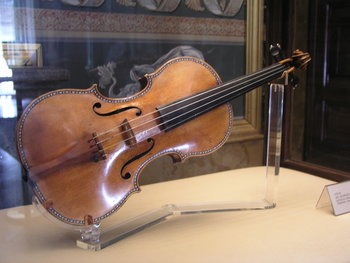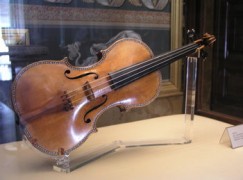How to make a Stradivarius: Pass the salt, please…
NewsFrom a new study of Cremona’s closely-guarded secret:
…”This new study reveals that Stradivari and Guarneri had their own individual proprietary method of wood processing, to which they could have attributed a considerable significance. They could have come to realize that the special salts they used for impregnation of the wood also imparted to it some beneficial mechanical strength and acoustical advantages. These methods were kept secret. There were no patents in those times. How the wood was manipulated with chemicals was impossible to guess by the visual inspection of the finished product.”
Read on here.







That conjecture should be easy to test… start soaking the wood for modern instruments in the salt mixture and see if anything better-sounding results.
It probably won’t, but I doubt we’ll hear about it.
There are too many variables. Just shaving the wood thinner or thicker in spots will change the vibrational behavior as much or more than a varnish or a salt.
I recall Itzhak Perlman saying that these Cremona instruments were not regarded as unusually notable for their sound until after they were getting rebuilt in the early 19th Century with altered necks, bass bars, bridges…
If that is true, then Stradivari’s secret-process wasn’t creating any magical sound that he could audition and refine in his lifetime.
Itzhak Perlman, if he truly said that, WOULD say something that stupid. Cremonese violins were built for baroque playing NOT for the whole modern Schpiel which Hillary Hahn aka Vuillaume started by adding. Baroque instruments weren’t into making that much noise about which is the best. Since it’s all so linear and mapped out. He also decided that Oistrakh’s violin wasn’t made out of good wood, which also would add to his brand of knowledge, to get how much a pop in front of a mob of such.
And please tell us how to shave the wood thicker……
If you’re old enough and have an interest in the topic, you don’t have enough fingers to count the few dozen breathlessly proclaimed discoveries of Stradivari’s “secrets.” Professor Jack Fry made huge headlines years ago making the same general proclamation, for example, and based on “science.” Blood, wine, urine, now salt, have all been offered up. Mel Brooks’s 2000 Year Old Man would probably suggest Liquid Prell, which he regarded as the greatest discovery ever.
My own grandfather used a different recipe for varnish for every violin he made (“each one smelled worse than the one before,” my dad told me) and hoo-boy did he ever fail at even approaching the “secret.” It was pure experimentation and trial and error. He got the error part down pat.
OK, so just maybe they’ve finally hit on it. But I wonder how secret this secret could have been. There is an entire generation (or two) of Cremona-made violins by a number of makers, and not just Antonio’s son(s), who seemed to all know the “secret,” even if their craftsmanship or imagination didn’t measure up. Some non-Cremonese Italians seem to have known it too, and some believe the “secret” was still employed by Italian violin makers into the 19th century such as Joseph Rocca, or Pressenda. I recall reading an article that suggested that Italian-made furniture of the era seemed also to possess a now-lost “secret” to its varnish not unlike (or even, maybe the same as) the secret known by and used by Stradivari and del Gesu and the crew. Some have suggested it was no secret at all – “everybody” knew it so they never bothered to write it out, and then suddenly they didn’t know it anymore, or it got expensive and replaced and then forgotten. Just like they used to know how to make appliances such as toasters and hot water heaters and dishwashers that lasted more then 7 years, and now they don’t know how any more.
Stradivari had as many secrets it seems as Salome had veils.
Is it such a coveted secret, given that even experts can’t seem to tell the difference in sound between great old Italian violins and good modern violins in double blind studies?
Anything with personality, or individuality takes more time to get to know than would happen in a blind study. Not even the drug companies have such ability with their “science.”
I knew the wood was seasoned, but not quite in that way 🙂
30 years ago I read that they soaked the wood in the sea
Very nice study indeed M.Norman.
At last some old topic resurfaces with scientific evidence.I had heard about the “blind study” which I confess made me smile.I was then convinced that this Stradivarus belief was “psychoacoustics” and still am convinced of that conclusion amid the scienrific evidence.
Science brings up some chemical evidence that we cannot deny of course.Science is above all conjectures.
But music perception has the last word,at least to me.
I am no violonist and am not very keen on listening to that instrument -I confess!
May be that is what explains my opinion.
Frustrating: the headline of this and similar articles claims or strongly implies that Strads are unequaled, and there is a secret of their construction or materials that explains this. Meanwhile, the article simultaneously debunks the premise and claims to have solved the mystery of the nonexistent phenomenon. There is an uncomfortable combination of rigorous research and absurd conclusions that makes me, for one, shake my head in bemusement every time I encounter a new iteration of it.
In my opinion this Strad story is overdone.
-Why isn’t there the same topic over pianos???Is there a best piano??
-Similarly science starts analysing the paintings of Da Vinci etc….what is the point of this research?
It does not make me love the paintings better than I actually do?
Of course it can’t just be architecture, just like the human body, just a healthy one isn’t good enough, one needs the drug companies, corporate media to promote it, protection by nuclear weapons and…….
If you want to find the secret, try asking the police where Stradivari treasures are hidden. Machold doesn’t seem to know why they are missing, although the secret is a hot item.
One might also simply look at the fact that in the golden period, they hadn’t yet assimilated the whole “civilized” society to the equal tempered well tempered system, and vibrations still had an accuracy towards each other beyond such compromises. And so they tuned their plates, of their instruments, more sensitivity.
And give me a break. Hilary Hahn going on that children should be able to sing a tone row, and leave it at that, when perhaps those that even in such a parlor game could only actually sing one would they find resonance within what’s left over of the pitches, and not just like an android spit out all 12 supposedly democratic pitches. Yes, they might find something they wouldn’t have otherwise, given the game of fitting in other “odd” pitches, but that’s more than just the game, you see.
And sorry, but I don’t see a Vuillaume violin, with its linear ability to spit out all notes, that it does the same as when a Stradivari or Del Gesu blossoms and gives a healing matrix to a phrase, the very phonons of sound that have shown to have quantum entanglement properties, and resonate to blossom, to swell up create a haven of space in a matrix where time can’t be linear (what none of art is, when it gives emotions a home and perspective on life), that they blossom. But then again, that’s not going to step to the side, and make it easy to stamp out the well tempered compromise……